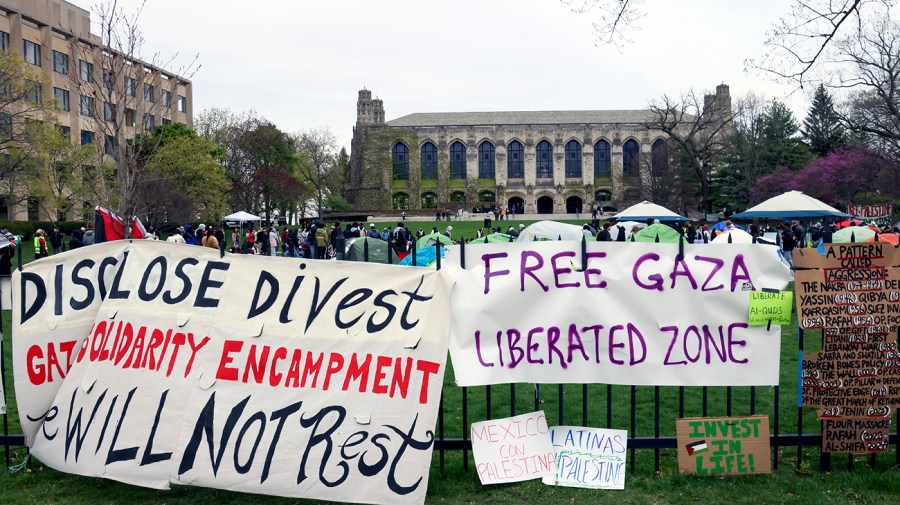
Colleges that used police force to end their recent on-campus student protests are facing criticism for their handling of the situation, but so are the small handful that cut deals to end the demonstrations.
The few universities that successfully negotiated to end the pro-Palestinian encampments — among them Northwestern, Brown, Rutgers and Johns Hopkins — made concessions that are proving controversial, particularly complete amnesty or more favorable disciplinary proceedings for protesters who have broken campus rules.
Activists are praising the outcomes, however, and experts say only time will tell if the colleges made the right call.
“I think that the university leaders who have made the deal with the protesters have been wise to do so and have really kind of shown what leadership should look like in higher education,” said Marcella Bombardieri, a senior fellow for the higher education team at the Center for American Progress. “I think that they are recognizing that there is actually a teachable moment here on both sides.”
One of the main goals of the Gaza war protests was divestment of school endowments from Israel, which no encampment was able to outright achieve.
Some of the schools that reached deals with activists agreed to allow students to present their arguments for divestment to their school board, or to put together a new committee on the issue. Brown University guaranteed its board would vote on the matter.
The president of Sonoma State University agreed to an academic boycott of Israel but was later suspended due to “insubordination” over the agreement.
Northwestern committed to give free tuition to a certain number of Palestinian students and to hire more Palestinian faculty, while Rutgers said it would explore the creation of an Arab Cultural Center.
All the deals ended with school administrations in some way condemning the violence in Gaza.
“I acknowledge the profound grief that many in our community feel over the tragic effects of the ongoing war. There will continue to be deep disagreements and strongly felt emotions as we experience pain and distress over events in the wider world,” the interim president of Harvard said in a statement.
In exchange, students have taken down their encampments and agreed to abide by school rules around demonstrations through the end of the academic year.
Critics, however, say administrators have set a terrible precent in agreeing to more lenient disciplinary proceedings for activists.
Schools that “strike deals with groups of students that engage in repeated violations of school policies is a horrible idea because it encourages and rewards rule violation at the university. This is going to lay the groundwork for increasingly disruptive behavior going forward,” said Jay Greene, senior research fellow in the Center for Education Policy at the Heritage Foundation.
“The worst part about the deals is amnesty for rule-breaking,” Greene said, “because no one knows what impermissible behavior can be forgiven at any time, so that’s a very dangerous precedent.”
Brown University said that while the protesters broke several policies by setting up tents and camping out on school property, it would look “favorably in disciplinary proceedings” for the demonstrators, given the circumstances.
The University of Minnesota, meanwhile, offered a blanket pardon to students who’ve participated in protests over the past few weeks with the goal of wrapping up those demonstrations.
“Universities have wide discretion when it comes to punishment and enforcing its rules. And I think that they need to exercise that to make sure that the punishments are not disproportionate to what students have done,” Bombardieri said.
“When you have people who are peacefully expressing their views on a really disastrous, tragic situation that is unfolding before our eyes that they should be really should be looking for opportunities to make, again, make it a learning experience for students and not a punitive one,” Bombardieri added.
Some suspect the reason the schools capitulated at all and didn’t simply ride the protests out until the summer when students went home was their looming graduation ceremonies.
“Commencement is the day when the grass has to be green, the flowers have to be pretty so that all of the parents and alumni can see the beautiful campus that they will remember and write checks — and so they had to get rid of these protests” Greene said.
But he said attempts in the future to follow through with disciplinary measures could potentially get the schools in legal trouble due to their decisions today.
“They could switch their minds in the future and decide to enforce the rules going forward but it just becomes harder and harder,” Greene said, pointing to “the problem of discriminatory enforcement.”
“So, if you enforce the rules on one group of protesters, but not on another, that could also expose these universities to Title IX or other legal liabilities.”













